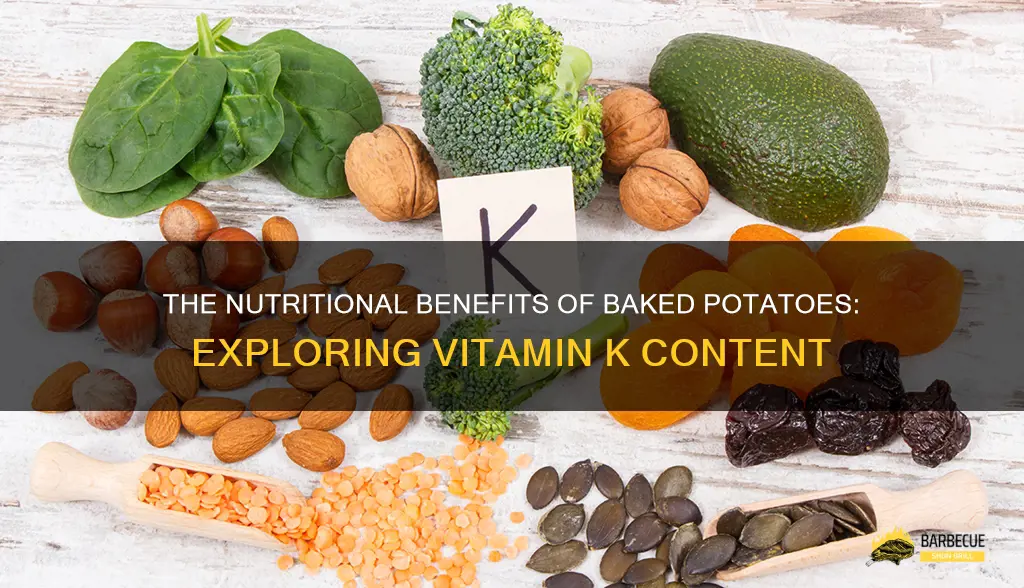
Did you know that enjoying a baked potato can not only be a delicious and comforting meal, but it can also provide you with a healthy dose of vitamin K? Yes, it's true! Baked potatoes are surprisingly high in vitamin K, which plays a crucial role in blood clotting, bone health, and even cardiovascular health. So, the next time you indulge in a perfectly crispy baked potato, know that you're not only treating yourself but also giving your body a boost of this essential nutrient.
| Characteristics | Values |
|---|---|
| Vitamin K | High |
| Calories | 161 |
| Carbohydrates | 36 grams |
| Fiber | 4 grams |
| Protein | 3.6 grams |
| Fat | 0.2 grams |
| Vitamin C | 28% of daily value |
| Potassium | 897 milligrams |
| Vitamin B6 | 46% of daily value |
| Magnesium | 12% of daily value |
What You'll Learn

Introduction to baked potatoes and their nutritional content
Baked potatoes are a delicious and versatile food that can be enjoyed in a variety of ways. Whether you prefer them loaded with toppings or served as a side dish, their nutritional content makes them a great addition to any meal. In this article, we will explore the nutritional benefits of baked potatoes and find out if they are high in vitamin K.
First, let's delve into the general nutritional content of baked potatoes. One medium-sized baked potato, which is approximately 173 grams, contains about 161 calories. It is worth noting that the calorie content may vary depending on the size and type of potato used. Baked potatoes are also a good source of dietary fiber, providing around 3.8 grams per potato. Dietary fiber is essential for maintaining a healthy digestive system and can help prevent constipation.
In terms of macronutrients, baked potatoes are primarily composed of carbohydrates, with around 36 grams per potato. Carbohydrates are the body's main source of energy, making baked potatoes an excellent choice for individuals with active lifestyles. Moreover, they are virtually fat-free, making them a healthier alternative to higher-fat options like French fries or potato chips.
Baked potatoes are also a good source of various essential vitamins and minerals. They contain significant amounts of vitamin C, providing approximately 28% of the recommended daily intake in just one medium-sized potato. Vitamin C is an antioxidant that plays a crucial role in maintaining a healthy immune system and promoting collagen production. Additionally, baked potatoes are a good source of potassium, a mineral that helps regulate blood pressure and supports proper muscle and nerve function.
Now, let's address the question of whether baked potatoes are high in vitamin K. While baked potatoes do contain some vitamin K, the amount is relatively low compared to other vegetables such as leafy greens. One medium-sized baked potato provides only around 3 micrograms of vitamin K, which is approximately 4% of the recommended daily intake for adults. Therefore, if you're specifically looking to increase your vitamin K intake, you may want to consider incorporating other vitamin K-rich foods into your diet, such as spinach, kale, or broccoli.
In conclusion, baked potatoes are a nutritious food option that offers various health benefits. They are a good source of dietary fiber, vitamin C, and potassium, making them a valuable addition to a well-balanced diet. While baked potatoes do contain some vitamin K, they are not considered high in this particular nutrient. Nevertheless, they can still be enjoyed as part of a vitamin-rich meal plan alongside other vitamin K-rich foods to meet your nutritional needs.
The Quickest and Easiest Way to Bake a Russet Potato in the Microwave
You may want to see also

Importance of vitamin K in the diet for overall health
Vitamin K is an essential nutrient that plays a crucial role in various bodily functions. It is important for blood clotting, bone health, and the maintenance of overall cardiovascular health. While some sources of vitamin K, like green leafy vegetables and fermented foods, are well-known, others are lesser-known, such as baked potatoes. In this article, we will explore the importance of vitamin K in the diet for overall health and shed light on the vitamin K content in baked potatoes.
Vitamin K is a group of fat-soluble vitamins that include K1 (phylloquinone) and K2 (menaquinones). K1 is primarily found in green leafy vegetables, while K2 is present in fermented foods and animal products. Both forms are important for the body, and maintaining adequate levels of vitamin K is essential for optimal health.
One of the key functions of vitamin K is its role in blood clotting. When a person has a cut or injury, vitamin K helps in the formation of blood clots, preventing excessive bleeding. Without sufficient vitamin K, the body's ability to clot blood becomes compromised, leading to increased risk of bleeding disorders.
Vitamin K also plays a significant role in maintaining bone health. It helps in the production of osteocalcin, a protein that is essential for bone mineralization. Adequate vitamin K levels can help prevent conditions like osteoporosis and reduce the risk of fractures.
Moreover, vitamin K has been linked to cardiovascular health. It aids in preventing the calcification of arteries, reducing the risk of heart disease and stroke. By helping to keep the arteries flexible and free from plaque buildup, vitamin K supports overall cardiovascular health.
Now, coming to the question of whether baked potatoes are high in vitamin K, the answer is yes. Although not as high as green leafy vegetables, baked potatoes contain a moderate amount of vitamin K. The exact amount of vitamin K in a baked potato can vary depending on its size and variety, but on average, a medium-sized baked potato with the skin provides about 20-30 micrograms of vitamin K.
To maximize the vitamin K content in baked potatoes, it is important to consume them with the skin. The skin of a potato is rich in nutrients and contains a significant amount of vitamin K. Removing the skin would result in a loss of this valuable nutrient.
While baked potatoes can contribute to your vitamin K intake, it is important to note that they should not be solely relied upon as a source of this nutrient. Incorporating a variety of vitamin K-rich foods into your diet, such as leafy green vegetables, broccoli, Brussels sprouts, and fermented foods, is essential for meeting your daily requirements.
In conclusion, vitamin K is a vital nutrient that plays various roles in the body, including blood clotting, bone health, and cardiovascular health. While baked potatoes do contain vitamin K, it is important to consume them with the skin to maximize the nutrient content. However, it is crucial to incorporate a diverse range of vitamin K-rich foods into your diet to ensure you meet your daily requirements for optimal overall health.
Are Baked Potatoes Safe and Healthy for Dogs?
You may want to see also

Examining the vitamin K levels in baked potatoes
Baked potatoes are a versatile and delicious food that can be enjoyed in various ways. They are rich in several essential nutrients, including vitamin C, potassium, and dietary fiber, but are they high in vitamin K? In this article, we'll examine the vitamin K levels in baked potatoes and explore why this nutrient is important for our health.
Firstly, let's clarify what vitamin K is and its role in the body. Vitamin K is a fat-soluble vitamin that plays a crucial role in blood clotting and bone health. There are two main forms of vitamin K: vitamin K1 (phylloquinone) and vitamin K2 (menaquinone). While vitamin K1 is primarily found in plants, such as leafy green vegetables, vitamin K2 is produced by bacteria in our own gut and is also present in some animal-based foods.
While baked potatoes do contain a small amount of vitamin K, they are not particularly high in this nutrient. According to the United States Department of Agriculture (USDA) National Nutrient Database, a medium-sized baked potato with skin (approximately 2.5 inches in diameter) provides around 3 micrograms of vitamin K1 (phylloquinone). This amount represents about 4% of the recommended daily intake for adults (75-90 micrograms).
It's worth noting that most people's dietary intake of vitamin K is met through other sources, such as leafy greens, broccoli, and certain animal products like eggs and liver. Therefore, while baked potatoes can contribute to your overall vitamin K intake, they should not be relied upon as the primary source.
However, it's important to keep in mind that individual vitamin K requirements may vary depending on certain health conditions and medications. For individuals taking blood-thinning medications such as warfarin, it is crucial to maintain a consistent intake of vitamin K to ensure the medication's effectiveness. Therefore, it is advisable to consult with a healthcare professional or a registered dietitian regarding specific dietary recommendations for vitamin K consumption.
In conclusion, baked potatoes are not considered high in vitamin K compared to other food sources. While they do provide a small amount of this essential nutrient, it is recommended to incorporate a varied and balanced diet rich in a wide range of foods to meet your daily vitamin K requirements. Leafy green vegetables, such as kale and spinach, along with other sources like broccoli and eggs, can play a more significant role in fulfilling your vitamin K needs. Remember to consult with a healthcare professional for personalized dietary advice based on your individual health conditions.
A Step-by-Step Guide to Baking Diced Sweet Potatoes
You may want to see also

Incorporating baked potatoes into a vitamin K-rich diet plan
Baked potatoes, a delicious and versatile vegetable, can be a wonderful addition to your diet. Whether you are looking to increase your vitamin K intake or simply looking for a tasty and nutrient-packed side dish, baked potatoes are an excellent choice. In this blog post, we will explore the benefits of incorporating baked potatoes into a vitamin K-rich diet plan, as well as provide some delicious and healthy recipe ideas.
First and foremost, let's address the question: are baked potatoes high in vitamin K? The answer is yes! Baked potatoes are a good source of vitamin K, providing approximately 16% of the recommended daily intake per medium-sized potato. Vitamin K is an essential nutrient that plays a crucial role in blood clotting, bone health, and heart health. Incorporating baked potatoes into your diet can help you meet your vitamin K needs and support overall wellness.
Now that we know the nutritional value of baked potatoes, it's time to explore how to incorporate them into a vitamin K-rich diet plan. One simple and delicious way to enjoy baked potatoes is by topping them with vitamin K-rich ingredients such as broccoli, spinach, or kale. These leafy green vegetables are known for their high vitamin K content and can add a vibrant and nutritious twist to your baked potato. Consider steaming or sautéing these greens and adding them as a topping for your baked potato. You can also add a sprinkle of goat cheese or feta for added flavor and creaminess.
Another option to increase your vitamin K intake is to prepare a hearty potato and vegetable soup. Start by baking your potatoes until they are tender, then chop them into bite-sized pieces. In a large pot, sauté onions, garlic, and your choice of vitamin K-rich vegetables such as Brussels sprouts or green beans. Once the vegetables are cooked, add broth and the chopped baked potatoes. Simmer the soup until all the flavors meld together, and serve it with a side of whole-grain bread for a well-rounded and nutritious meal.
For those looking for a more portable option, consider making baked potato wedges. Cut the potatoes into wedges, sprinkle them with a little olive oil, salt, and pepper, and then bake them until golden and crispy. Pair these delicious wedges with a side of roasted red pepper hummus or guacamole for a nutritious and satisfying snack or appetizer.
In conclusion, baked potatoes are a fantastic addition to a vitamin K-rich diet plan. Packed with nutrients and incredibly versatile, they can be prepared in various ways to suit your taste buds. Whether you choose to top them with vitamin K-rich ingredients, incorporate them into a hearty soup, or make them into appetizing wedges, baked potatoes are an easy and delicious way to increase your vitamin K intake. So why not start adding this nutrient-dense vegetable to your next meal and enjoy the many health benefits it offers?
The Simple Guide to Boiling a Baked Potato
You may want to see also
Frequently asked questions
Yes, baked potatoes are a moderate source of vitamin K. One medium-sized baked potato provides about 15% of the recommended daily intake of vitamin K.
Vitamin K plays a crucial role in blood clotting and bone health. It helps produce proteins that are important for blood clotting, and it also helps regulate calcium, which is essential for strong bones.
Yes, baked potatoes can be a good source of vitamin K for people who are on a low-oxalate diet. Oxalates are compounds found in certain foods that can interfere with the absorption of calcium, but baked potatoes are low in oxalates. However, it's always best to consult with a healthcare professional or registered dietitian for personalized dietary advice.







